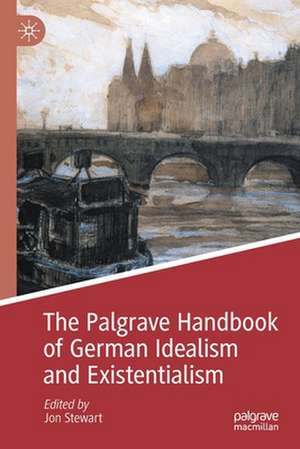The Palgrave Handbook of German Idealism and Existentialism: Palgrave Handbooks in German Idealism
Editat de Jon Stewarten Limba Engleză Paperback – 26 aug 2021
Key Features
- Operates at both the macro-level and micro-level, treating both the two schools of thought and the individual thinkers associated with them
- Explores the relations from shifting perspectives by examining how the German idealists anticipated existentialist themes and how the existentialists concretely drew on the work of the idealists
- Meticulouslyuncovers and documents many little-known points of contact between the German idealists and the existentialists
- Includes often neglected figures such as Jacobi and Trendelenburg
| Toate formatele și edițiile | Preț | Express |
|---|---|---|
| Paperback (1) | 1122.10 lei 6-8 săpt. | |
| Springer International Publishing – 26 aug 2021 | 1122.10 lei 6-8 săpt. | |
| Hardback (1) | 1128.39 lei 6-8 săpt. | |
| Springer International Publishing – 26 aug 2020 | 1128.39 lei 6-8 săpt. |
Preț: 1122.10 lei
Preț vechi: 1368.41 lei
-18% Nou
Puncte Express: 1683
Preț estimativ în valută:
214.71€ • 224.78$ • 177.66£
214.71€ • 224.78$ • 177.66£
Carte tipărită la comandă
Livrare economică 07-21 aprilie
Preluare comenzi: 021 569.72.76
Specificații
ISBN-13: 9783030445737
ISBN-10: 3030445739
Pagini: 576
Ilustrații: XX, 576 p.
Dimensiuni: 155 x 235 mm
Greutate: 0.83 kg
Ediția:1st ed. 2020
Editura: Springer International Publishing
Colecția Palgrave Macmillan
Seria Palgrave Handbooks in German Idealism
Locul publicării:Cham, Switzerland
ISBN-10: 3030445739
Pagini: 576
Ilustrații: XX, 576 p.
Dimensiuni: 155 x 235 mm
Greutate: 0.83 kg
Ediția:1st ed. 2020
Editura: Springer International Publishing
Colecția Palgrave Macmillan
Seria Palgrave Handbooks in German Idealism
Locul publicării:Cham, Switzerland
Cuprins
Part I: Anticipations of Existentialism in the German Idealists.- 1. The Stumbling Block of Existence in F. H. Jacobi; Paolo Livieri.- 2. Kant and Existentialism: Inescapable Freedom and Self-Deception; Roe Fremstedal.- 3. Fichte and Existentialism: Freedom and Finitude, Self-Positing and Striving; Steven Hoeltzel.- 4. Schelling as a Transitional Figure from Idealism to Existentialism; Zoltán Gyenge.- 5.“Return to Intervention in the Life of Human Beings”: Existentialist Themes in the Development of Hegel’s Social and Political Philosophy; C. Allen Speight.- 6. The Existentialist Basis of Schopenhauer’s Pessimism; Robert Wicks.- 7. An Early Ally of Existentialism? Trendelenburg’s Logical Investigations in the Mirror of Kierkegaard’s Literary Project; Heiko Schulz.- Part II: The Existentialists' Use of the German Idealists.- 8. Kierkegaard: A Transitional Figure from German Idealism to Existentialism; Jon Stewart.- 9. “The Honeymoon of German Philosophy”: Nietzsche and German Idealism; Daniel Conway.- 10. Buber and German Idealism: Between Philosophical Anthropology and Philosophy of Religion; Peter Šajda.- 11. Historicism, Neo-Idealism, and Modern Theology: Paul Tillich and German Idealism; Christian Danz.- 12. “The Last Kantian”: Outlines of Karl Jaspers’s Ambivalent Reception of German Idealism; István Czakó.- 13. Beyond the Critique of Judgment: Arendt and German Idealism; Matthew Wester.- 14. Heidegger and Kant, or Heidegger’s Poetic Idealism of Imagination; David Espinet.- 15. Heidegger and German Idealism (Fichte, Schelling, Hegel): Subjectivity and Finitude; Sylvaine Gourdain and Lucian Ionel.- 16. Jacques Maritain: A Thomist Encounters Existentialism; Lee C. Barrett.- 17. The Ethics of Resistance: Camus’s Encounter with German Idealism; Thomas P. Miles.- 18. Merleau-Ponty and Hegel: Meaning and its Expression in History; David Ciavatta.- 19. Hegel and Sartre: The Search for Totality; Bruce Baugh.- 20. Women, Jews, and Other Others: The Influence of Hegel on Beauvoir and Levinas; Claire Katz.
Notă biografică
Jon Stewart is Research Fellow at the Institute of Philosophy at the Slovak Academy of Sciences, Slovakia. Founder and general editor of the multi-volume series, Kierkegaard Research: Sources, Reception and Resources, he has authored eleven books including Kierkegaard's Relations to Hegel Reconsidered (2003) and Søren Kierkegaard: Subjectivity, Irony, and the Crisis of Modernity (2015), as well as over forty articles on German idealism and 19th century continental philosophy.
Textul de pe ultima copertă
This Handbook explores the complex relations between two great schools of continental philosophy: German idealism and existentialism. While the existentialists are commonly thought to have rejected idealism as overly abstract and neglectful of the concrete experience of the individual, the chapters in this collection reveal that the German idealists in fact anticipated many key existentialist ideas. A radically new vision of the history of continental philosophy is thereby established, one that understands existentialism as a continuous development from German idealism.
Key Features
Key Features
- Operates at both the macro-level and micro-level, treating both the two schools of thought and the individual thinkers associated with them
- Explores the relations from shifting perspectives by examining how the German idealists anticipated existentialist themes and how the existentialists concretely drew on the work of the idealists
- Meticulouslyuncovers and documents many little-known points of contact between the German idealists and the existentialists
- Includes often neglected figures such as Jacobi and Trendelenburg
Caracteristici
Challenges the traditional understanding of the relation between German Idealism and existentialism as one of fundamental opposition Identifies the important differences in the two movements in insightful and thought provoking ways Treats often neglected figures such as Jacobi and Trendelenburg










